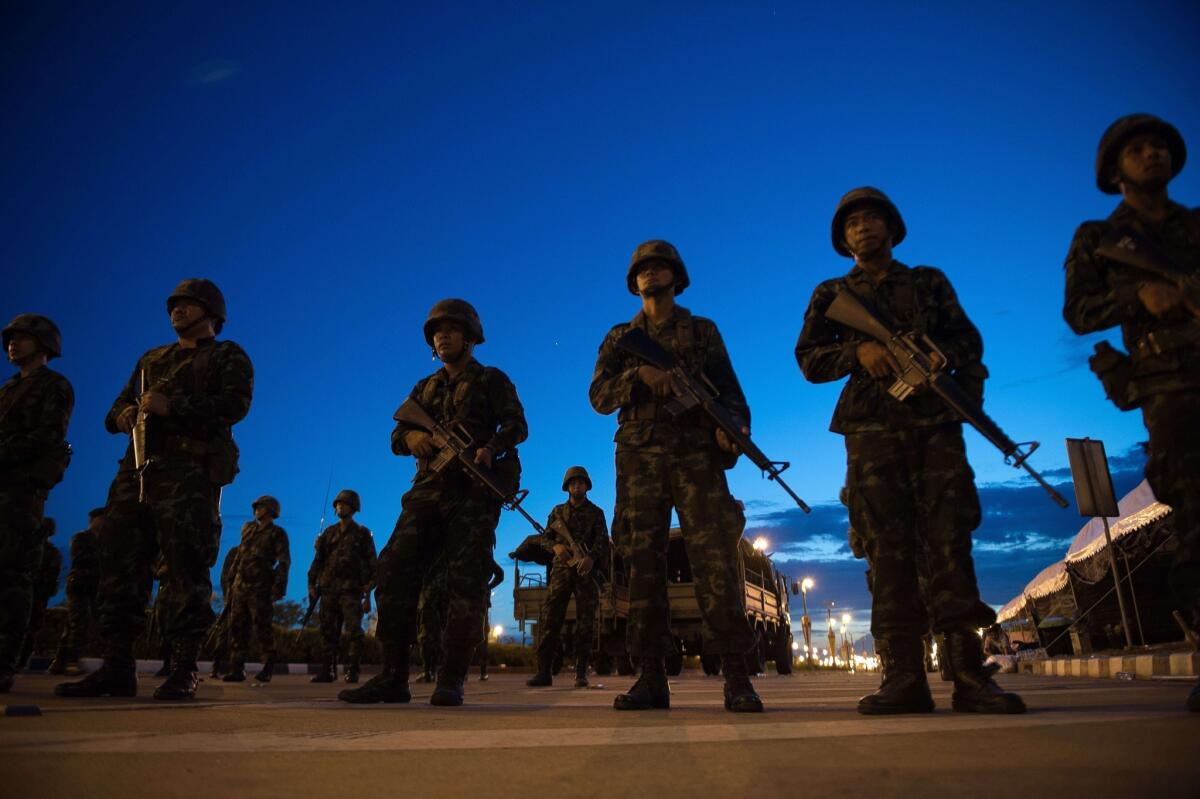Thailand’s military seizes power in coup, vows to restore stability

- Share via
reporting from BANGKOK — Thailand’s military on Thursday seized power from a caretaker government, declaring that the takeover was necessary to end six months of political crisis and often violent protests. It was the 12th coup in Thailand in 84 years.
The televised announcement by the army chief, Gen. Prayuth Chan-ocha, came two days after the military declared martial law. Prayuth said that talks facilitated by the army since Tuesday had failed to break an impasse between government and opposition leaders.
Pledging to restore stability, Prayuth said the military had formed a “national peacekeeping committee” that would bring the situation back to normal as soon as possible and would “protect the monarchy.”
The military maintained a light presence in the streets Thursday, and Bangkok was largely calm as a 10 p.m. curfew went into effect. An army spokesman said the curfew would be lifted at 5 a.m. Friday and that members of the armed forces and police were not to mobilize unless instructed by the peacekeeping committee.
All television channels except the military’s were forced off the air, although some Thai journalists were posting updates on Twitter.
Party leaders were rushed from closed-door meetings at the Army Club in Bangkok to a barracks where they will be kept under house arrest, officials said. A government official who spoke to The Times on condition of anonymity said “it is normal for the leaders to be kept under house arrest for their own safety under these circumstances.”
The official described the two days of talks as “chaotic, and neither side wanted to budge.”
The coup was widely seen as inevitable after the Royal Thai Army imposed martial law nationwide on Tuesday in what it said was a bid to restore stability. Opponents of the caretaker government linked to ousted former Prime Minister Thaksin Shinawatra had vowed a final push to dislodge the leadership after six months of dueling street rallies by government supporters and opponents had left more than 20 people dead.
The government had been led by Thaksin’s sister, Yingluck Shinawatra, until she was forced from office by a Constitutional Court ruling two weeks ago. An interim prime minister had pledged not to bow to protesters’ demands and to go ahead with elections scheduled for this summer.
The army on Thursday ordered the dwindling number of protesters remaining in the streets to disperse. About 5 p.m., soldiers cleared pro-government “red shirt” protesters from their encampment on Aksa Road in Bangkok and arrested demonstrators who were guarding the site.
A cheer went up at the main anti-government demonstration site when the coup was announced. Government opponents have been angling for a military takeover they hoped would forestall elections, which Yingluck Shinawatra’s governing party was expected to win.
“The anti-government protesters knew they can’t compete in the game of democratic politics,” said Pavin Chachavalpongpun, a former Thai diplomat who is a professor at the Center for Southeast Asian Studies at Japan’s Kyoto University. “They have been successful in creating a situation of ungovernability, where the military had to step in.”
Special correspondent Paluch reported from Bangkok and Times staff writer Bengali from Mumbai, India.
More to Read
Sign up for Essential California
The most important California stories and recommendations in your inbox every morning.
You may occasionally receive promotional content from the Los Angeles Times.














